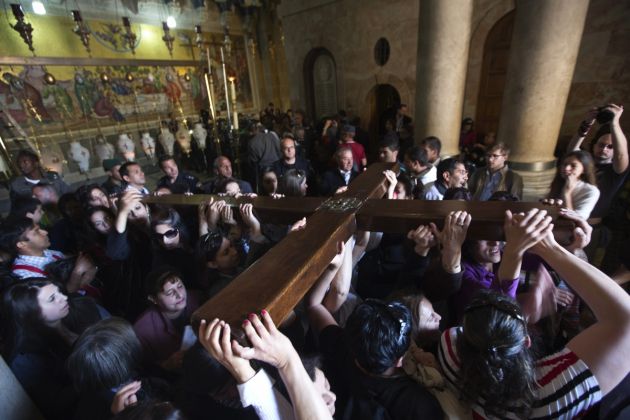Colosseum Way of the Cross highlights Middle East Christians

Meditations for the Way of the Cross on Good Friday at Rome's Colosseum were written by a group of young Catholics from Lebanon for a service in which Pope Francis reached out to Muslims.
Lebanese Tony El Chayeb and Firas Wehbe wrote the meditations under the guidance of Maronite Patriarch, Cardinal Bechara Rai.
He was invited to write them following Pope Benedict's visit to Lebanon in 2012.
"This evening we have heard the witness given by our Lebanese brothers and sisters: they composed these beautiful prayers and meditations. We extend our heartfelt gratitude to them for this work and for the witness they offer," said Pope Francis.
"We were able to see this when Pope Benedict visited Lebanon: we saw the beauty and the strong bond of communion joining Christians together in that land and the friendship of our Muslim brothers and sisters and so many others.
"That occasion was a sign to the Middle East and to the whole world: a sign of hope," he said.
El Chayeb and Wehbe spoke in a Vatican Radio interview about how emigration is sapping Middle East Christian numbers
They also spoke of how the themes touched on during the meditations were inspired by the plight of the minority Christian communities living in the Middle East.
El Chayeb wrote the meditation for the 10th Station of the Cross.
He explained how it talks about how "Jesus Christ is really giving us new hope and really helping us to understand better what is our mission in this Orient [Middle East]."
El Chayeb said, "We are more and more attached to our land and with this persecution we are sure Christ is with us."
He noted, "This way of the Cross of the Cross I is for every Christian because without the Cross there is no Resurrection."
There are many difficulties facing Christians today in Lebanon including "the temptation to emigrate to other countries," said El Chayeb.
Charles M. Sennott wrote in the Global Post on March 29, "Today the indigenous Christians of the Middle East who see themselves as part of a 2,000-year continuum of the religion's history are steadily disappearing in the land where the faith began.
"Pews are emptying in churches of the West Bank town of Bethlehem, where the Bible proclaims that Jesus was born; in Egypt, where the Holy Family fled the wrath of King Herod; in the northern Israel town of Nazareth, where it is believed he came of age as a young boy; in Jordan where Jesus was baptized on the banks of the Jordan River; in Lebanon, where he preached the gospel in the Phoenician town of Tyre; and in Jerusalem, where Christians believe God called upon Jesus to sacrifice his own life so that the sins of humanity could be forgiven."
Two years after the events dubbed the Arab Spring provoked rebellion and revolution to install new rulers in Egypt, Libya and Tunisia, triggering a brutal war in Syria, a new form of Islam is taking root.
Many Christians there say it is making life more difficult and uncertain.
The other young Lebanese man who was involved in the Way of the Cross project Wehbe said he believes "it is a sign from God" to continue their "mission living in the Middle East as Christians."
Asked if he fears for the future given the civil war in neighboring Syria, and the turmoil in so many countries of the Middle East, he spoke of being "optimistic despite the war," and said, "we feel it is our mission to stay."
Wehbe said he believes Lebanon should be "an example" for all countries, of co-existence between people of different faiths.
"Lebanon is not a country, it is a message of peace as Pope John Paul said when he came to Lebanon," said Wehbe.
He said the main challenge of Christian was to continue existing as a living community at a time when so many Christians are emigrating from the area.